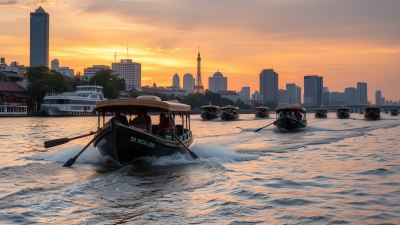Why Travel Feels Different When You See It Like a Director Would
Discover how viewing travel through a director's lens transforms your experiences and perspectives.

When we embark on a journey, we often take on the role of a traveler, a seeker of new experiences and cultures. However, there’s a profound difference when one chooses to experience travel through the lens of a director. Understanding how a director perceives their surroundings can enhance our travel experiences in ways we may not have imagined. In this article, we delve into the multifaceted reasons why travel feels remarkably different when one adopts a director's perspective.
1. The Art of Observation
One of the most significant differences in experiencing travel as a director is the heightened sense of observation. Directors are trained to notice details that others may overlook. They observe light, shadows, colors, textures, and movements in their environment. When traveling, this sensitive approach can transform a mundane moment into a captivating scene. You may find yourself captivated by the interplay of light on a historical building, the genuine expressions of locals in a market, or the rhythm of a bustling city. By learning to tease out these details, you can enhance your travel experience, inviting a more personalized and intimate connection with each destination.
2. Framing Perspectives
A director often utilizes framing techniques to guide the audience's focus. Similarly, when traveling, you can apply framing to your experiences. By consciously choosing what to emphasize in your photos or experiences, you create a narrative that resonates with you. For example, while visiting a famous landmark, you might choose to capture it from an unusual angle, imbibing your photo with a sense of creativity and context. This practice not only enhances personal memories but can also foster a deeper appreciation for the cultural significance of a place.
3. Storytelling Through Travel
Every location you visit has its own unique story. Adopting a director's mindset allows you to understand and appreciate these narratives more deeply. Each journey can be framed as a story arc with its own characters, conflicts, and resolutions. For instance, meeting a local artist in a quaint town might serve as your character development, while the conflicts could involve language barriers or navigating a new culture. Understanding this narrative structure not only enriches your experience but can also inspire you to share your adventures more creatively with others.
4. Embracing Emotion
Directors have an innate understanding of how to evoke emotion through visual storytelling. When traveling, tapping into these emotional layers can provide profound insights into the places you visit. Instead of merely observing a culturally rich festival, a director would immerse themselves in the emotions of the participants—joy, nostalgia, and community spirit. This empathetic approach allows travelers to connect on a human level, leaving indelible memories that go beyond photogenic snapshots.
5. Creating Unique Content
The modern traveler, inspired by the techniques of filmmakers, tends to create unique content that reaches far beyond social media posts. Adopting a director's perspective can inspire one to create vlogs, short films, or photo essays. These forms of communication can encapsulate the essence of travel in a way that mere written journals or Instagram posts often cannot. By exploring storytelling techniques like character development and conflict resolution, travelers can craft engaging narratives that resonate with audiences and preserve memories in a more impactful manner.
6. Encouraging Experiential Learning
When viewing the world through a director’s eyes, you cultivate a desire for experiential learning. Travel becomes more than a series of sightseeing stops; it transforms into an exploration of cultures, histories, and perspectives. Directors are known for their ability to delve deep into character backgrounds, exploring context and motivation. Similarly, travelers can enhance their experiences by researching the history of each place they visit, engaging with locals, or participating in cultural events. This commitment to experiential learning allows for a deeper understanding of the world, turning simple trips into enlightening journeys.
7. Crafting a Personal Narrative
Every film is grounded in a narrative, reflecting the director’s vision, experiences, and interpretations. Travel is no different. When you frame your journeys as personal narratives, you relate your experiences to your values and beliefs, allowing you to create stories born out of genuine encounters and experiences. This self-reflection enables you to uncover your motivations for traveling, what draws you to specific places, and how each journey influences your perspective on life.
8. Connecting with Others
One of the most enriching aspects of traveling is the connections we forge. Adopting a director's lens fosters the ability to observe and engage with others on a deeper level. This can manifest in various ways—actively listening to someone’s story, asking thoughtful questions, or simply sharing a moment of laughter with a stranger. By seeing others as characters in the film of your life, you cultivate an authentic interest in their stories, enriching your travel experience and forming lasting bonds.
9. The Role of Sound and Music
Sound is a powerful storytelling tool often overlooked in travel. Directors are keenly aware of how sound enhances a scene. While exploring new destinations, take note of the sounds that populate your environment—the distant chatter of locals, the hum of city life, or the peaceful rustle of nature. These audio landscapes significantly contribute to the ambiance and can evoke powerful memories when you recall your experiences later. Consider documenting the sounds around you, as they’ll enrich your recollections and help transport you back to those moments.
10. Challenges and Conflict Resolution
In filmmaking, conflicts are integral to keeping an audience engaged. Travel often presents challenges—lost luggage, language barriers, or changing itineraries. Instead of viewing these as hurdles, consider them as plot twists in your travel narrative. This perspective allows you to approach obstacles with creativity and resilience. Just as a director navigates unexpected changes during filming, you can learn to adapt to circumstances while traveling, creating stories filled with growth and discovery.
11. The Reflective Journey
Furthermore, the director's lens invites a reflective perspective on the journey. Post-travel reflection is essential for consolidating learning and experiences. Journaling, discussing with fellow travelers, or creating visual stories can allow you to process your experiences and extract meaningful insights. Reflective practices help you understand how travel has impacted your worldview and how you can carry these lessons into your everyday life.
12. The Traveling Director's Mindset
Appling a director's perspective involves cultivating a mindset of curiosity and creativity. Seek out the stories of the places you visit, interact with characters you meet, and approach each moment with a sense of wonder. By doing so, travel becomes an opportunity for artistic expression and emotional growth. Embrace spontaneity and allow yourself the freedom to deviate from traditional itineraries. Some of the most memorable travel encounters happen off the beaten path, fueled by the desire to create and connect.
Seeing travel through the eyes of a director reshapes how we experience the world. From sharpening our observational skills to enhancing emotional connections, adopting this lens can contribute to a more fulfilling and enriching journey. Whether through narrative storytelling, capturing unique angles, or engaging deeply with local cultures, we can transform our encounters into masterfully woven tapestries of personal experiences. Ultimately, each trip can become a cinematic achievement, inviting us to perceive, reflect, and grow in ways that resonate deeply beyond the destination.











